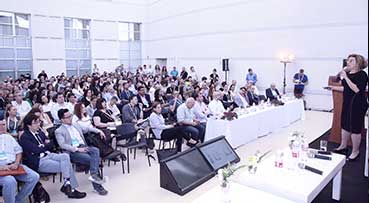Unlike the pandemic, which halted global operations, the war in Israel is uniquely ours while the rest of the world moves on. Shortly after offering empathetic “we feel for you” messages, stakeholders expect reassurances that commitments are being met. Equally pressing is the responsibility to sustain economic stability; the post-conflict era looms large, and our fight against terrorism includes ensuring that our lives, businesses, future investments, and economic equilibrium remain unshaken. Consequently, leaders are focused not just on today, but on securing a stable tomorrow and the days that follow.
The understanding that we’ve moved to the phase we call a “crisis routine” has ratcheted up tensions between management and people. Business continuity demands bringing people back to work, but how can this be accomplished while maintaining a humane approach? In a fraught atmosphere, where each decision carries weight and missteps can have lasting repercussions, organizations must scrutinize their treatment of employees. The public’s reaction is unlike any seen in previous conflicts; it’s now shaped by post-pandemic expectations and evolving trends that have already necessitated a shift in organizational behavior. Layer on the complexities of the this current war, and it becomes clear that a new, empathetic approach adapted to the ever-changing work landscape is essential. One misguided choice could jeopardize not only ongoing business objectives but also the organization’s identity in the post-crisis world.
Some potential pitfalls to avoid include:
Mistake 1: Failing to Master Remote Management
If your employees can effectively work from home and you’re still resisting it, it’s time for some soul-searching. The hard truth usually boils down to a lack of trust; you haven’t yet figured out how to manage remote teams, assess their performance, or cultivate an environment of mutual trust and accountability. This issue extends beyond the immediacy of a crisis. If your teams can execute tasks remotely and their productivity can be measured, requiring physical presence solely due to mistrust will not only disrupt business continuity, but also erode your ability to retain and attract talent, both during and post-conflict. In the absence of crises, knowledge-based organizations clinging to outdated norms will struggle to compete, as top performers now have alternatives. The future of work is not just a matter of location, but also a shift toward outcome-based management nurtured by trust.
The solution? Leverage the current crisis to develop a robust hybrid work model that covers at least emergency scenarios, complete with clear guidelines and tools for both managers and employees.
Mistake 2: Equating Fairness with Uniformity
If you’re in a sector that necessitates some in-person services, you may require all employees to report to the office under the banner of “fairness.” The rationale often being that it’s “unfair” for frontline workers to report in while office staff have the option to work remotely. However, confusing fairness with uniformity is a significant misstep. True fairness isn’t about treating everyone the same, but about giving each individual what they need to succeed and thrive. It’s about equity of outcomes rather than uniformity of process. This holds particularly true in crisis circumstances, but it’s also a principle that applies in the evolving landscape of everyday work. The pandemic already served as a crash course in tailoring policies to individual needs—especially when health and wellness are at stake.
So what’s the solution? Personalization. A warehouse or retail employee won’t question why the back office teams can work remotely during the war, but they might wonder why these teams can’t rotate into on-site roles, allowing frontline workers some respite and time with family. It is your responsibility to recognize and address the unique challenges each employee faces, adapting strategies accordingly.
Mistake 3: Attempting to Impose Business as Usual
Insisting on a return to business as usual amid a volatile security climate isn’t just impractical—it’s tone-deaf. While maintaining operational continuity is crucial, coercing employees to prioritize work over personal concerns, under threat of layoffs or severance, is counterproductive. When pitted against each other, life will always triumph over work, rendering the conflict pointless.
So what’s the answer? Foster a reciprocal relationship between the organization and its workforce. Leaders who acknowledge and accommodate the personal challenges facing their staff create an environment where employees reciprocate with organizational commitment. The key lies in one-on-one dialogues between managers and employees, evaluating individual circumstances and strategizing on harmonizing both work and personal needs. Achieving this equilibrium by rooting decisions in a shared sense of purpose and mutual understanding empowers employees to focus and contribute meaningfully, even amid their own personal trials.
Mistake 4: Failing to Empower Your Managers
Resisting the temptation to look solely to upper management for guidance during crises is vital. Frontline managers serve as both buffers and bridges, mediating between executive directives and the realities faced by ground-level employees. They are uniquely positioned to either exacerbate or mitigate misunderstandings, conflicts, and information bottlenecks. As the organization’s pulse, these managers are crucial for fostering authentic communication, establishing psychological safety, and gauging what actually works on the ground. Neglecting to empower them effectively mutes not only a key information conduit but also a pivotal trust and engagement channel, one that is instrumental for operational success.
So what’s the course of action? Equip managers with the tools to exercise flexibility within a structured framework. Start by ensuring they fully grasp the broader organizational strategy, key priorities, and the rationale behind ongoing operations. Actively listen to their feedback; if they can’t understand the directives, they can’t relay them effectively to their teams. Following that, bolster their capacity for maintaining consistent, multi-dimensional communication with staff, enabling them to tailor solutions that meet both individual needs and organizational objectives.
A war is a landscape where flux and uncertainty have become the status quo. Thus, mastering the delicate equilibrium between operational needs and employee well-being is both a moral imperative and a business necessity. Missteps in this arena carry a hefty price tag, not just during crises; they corrode the very trust and cohesion that constitute an organization’s lifeblood. In this time of emergency that touches every home, it’s prudent to sidestep pitfalls like resistance to flexible work arrangements, enforcing one-size-fits-all policies, disregarding life’s challenges, and failing to empower your managerial cadre. As we look toward the day after the crisis, navigating these complex challenges equips your leadership with next-gen competencies, fortifying organizational resilience and adaptability that will stand the test of virtually any circumstance.
United we stand.

![large-AX1A2125-2[1] large-AX1A2125-2[1]](https://niritcohen.com/wp-content/uploads/elementor/thumbs/large-AX1A2125-21-pnzedcs72atx5aeurqytqdiihxixlq02re9mlz805s.jpg)






